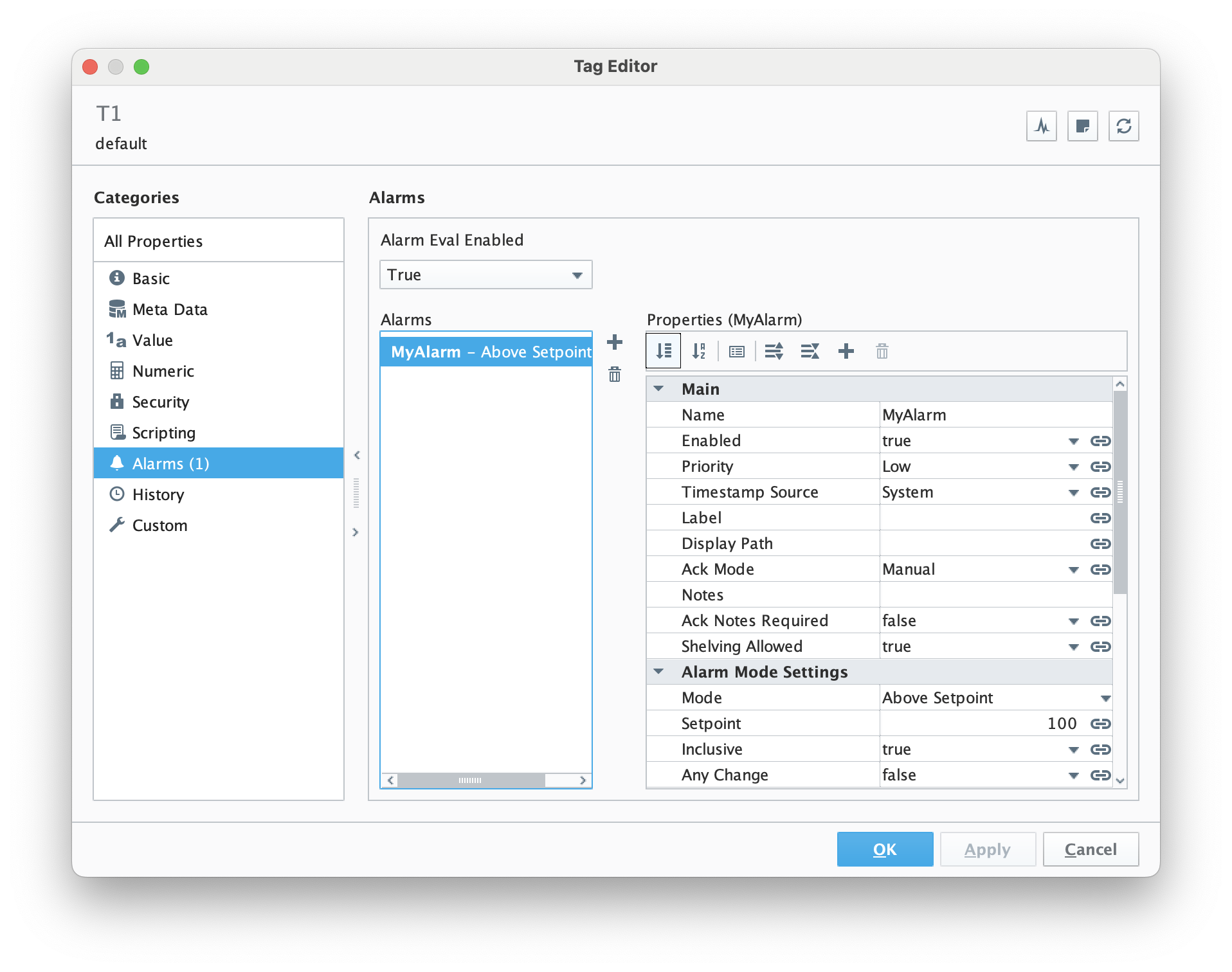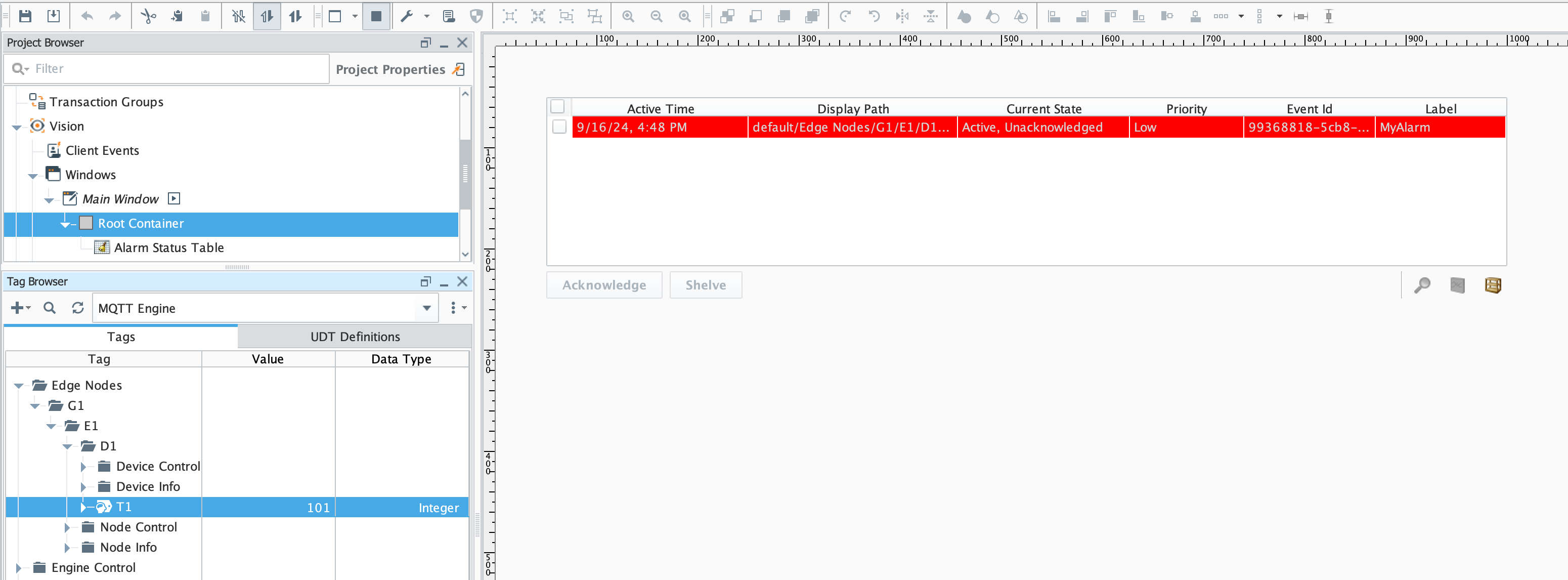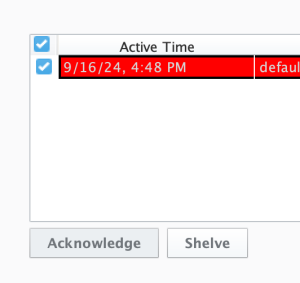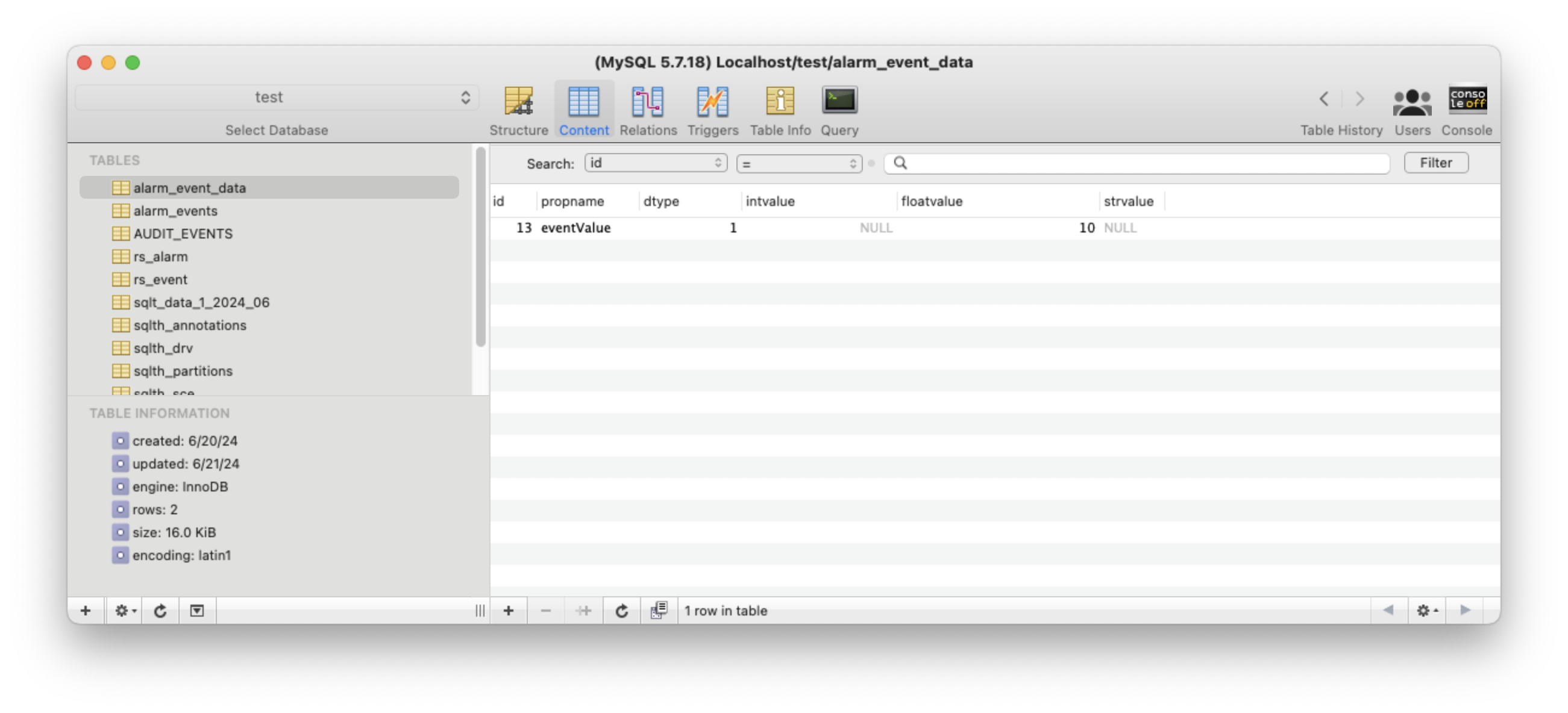MQTT Modules v4.0.23 and above
In MQTT Transmission and MQTT Engine support was added to transmit alarm events from the Edge (MQTT Transmission) to the Central Gateway (MQTT Engine) . They also now support acknowledgements from the Central Gateway (MQTT Engine) back to the Edge (MQTT Transmission).
To configure alarm event propagation from Transmission to Engine, follow these steps:
Ignition
- Stop the Ignition instances for both MQTT Transmission and MQTT Engine
Add a line similar to the following to the data/ignition.conf file on each Ignition instance replacing the 'XX' with the proper index per the wrapper.java.additional statements.
wrapper.java.additional.XX=--add-opens=java.base/java.util.concurrent.atomic=ALL-UNNAMED
- Restart the Ignition instances
MQTT Transmission
- Ensure that Alarm Event Enable has been set under the Transmitter Alarm Settings configuration
- Ensure that a Disk Backed History Store has been configured and that the Transmitter has been configured under History Settings to use this history store. We recommend configuring a rolling buffer to manage a MQTT Transmission keep alive timeout scenario.
MQTT Engine
- Ensure that the Alarm Event Enable has been set under the General Alarm Settings configuration
Testing
Set up a tag on the Transmission side with an alarm.
Below is an example that will generate an event if the value of the tag goes above 100:

- Trigger the alarm.
In this example, we set the value of the memory tag to 101. This resulted in an alarm event at the Edge as shown below in the Alarm Status Table:

- Because the alarm event was published via MQTT, we can also see it on the Central Gateway running MQTT Engine:

At this point, we can acknowledge the alarm at either the Edge or the MQTT Engine side via the Alarm Status Table by clicking the 'Acknowledge' button as shown below. Once acknowledged, it will be reflected as so on both the Edge and the MQTT Engine sides.

After doing so, you can see the acknowledged alarm on the Central Gateway (MQTT Engine side) :

and the Edge (MQTT Transmission side) :

Removing stranded alarms from the MQTT Engine Status Table
If alarms have been 'stranded' in the MQTT Engine Alarm Status Table, they can be cleared using the MQTT Engine Python Scripting API with the readAlarms and clearAlarms calls.
MQTT Modules v4.0.16 to v4.0.22
In MQTT Transmission and MQTT Engine v4.0.16 support was added to propagate triggered alarm events from the Edge to a Central Ignition Gateway. This can be used to insert alarm events into Ignition's alarm journal on the MQTT Engine side. Currently, these alarm events on the MQTT Engine side can not be currently be used in alarm pipelines, and they can not be remotely acknowledged from MQTT Engine back to MQTT Transmission.
To configure alarm event propagation from Transmission to Engine to insert them into the Engine side alarm journal, follow these steps.
Add a line similar to the following to the data/ignition.conf file but replace the 'XX' with the proper index per the wrapper.java.additional statements. This must be done on both the MQTT Transmission side as well as the MQTT Engine side.
wrapper.java.additional.XX=--add-opens=java.base/java.util.concurrent.atomic=ALL-UNNAMED
- Restart Ignition.
- Set 'Alarm Event Enable' in the MQTT Transmission Transmitter configuration to true.
- Set up an Alarm Journal in Ignition on the MQTT Engine side.
- Set up a tag on the Transmission side with an alarm.
- Trigger the alarm
- After doing so, you should see something similar to the following in the alarm journal on the MQTT Engine side:

Troubleshooting
If you have not updated the data/ignition.conf file on the Ignition instance(s) running MQTT Transmission and MQTT Engine correctly you will see this error in the Ignition logs from the com.cirruslink.mqtt.common.gateway.agent.alarm.AgentAlarmListener
Failed to handle the event
com.inductiveautomation.ignition.common.gson.JsonIOException: Failed making field 'java.util.concurrent.atomic.AtomicReference#value' accessible; either increase its visibility or write a custom TypeAdapter for its declaring type.
Double check that the wrapper.java.additional.XX=--add-opens=java.base/java.util.concurrent.atomic=ALL-UNNAMED syntax has been added to the ignition.conf file wrapper.java.additional statements and indexed correctly on both the MQTT Transmission and MQTT Engine Ignition instances.
Example from Ignition version 8.1.44
#********************************************************************
# Wrapper Java Properties
#********************************************************************
# Java Application
# Locate the java binary on the system PATH:
# Specify a specific java binary:
set.JAVA_HOME=lib/runtime/jre-win
wrapper.java.command=%JAVA_HOME%/bin/java
# Tell the Wrapper to log the full generated Java command line.
#wrapper.java.command.loglevel=INFO
# Java Main class. This class must implement the WrapperListener interface
# or guarantee that the WrapperManager class is initialized. Helper
# classes are provided to do this for you. See the Integration section
# of the documentation for details.
wrapper.java.mainclass=org.tanukisoftware.wrapper.WrapperSimpleApp
...
# Java Classpath (include wrapper.jar) Add class path elements as
# needed starting from 1
wrapper.java.classpath.1=lib/wrapper.jar
wrapper.java.classpath.2=lib/core/common/*
wrapper.java.classpath.3=lib/core/gateway/*
# Java Library Path (location of Wrapper.DLL or libwrapper.so)
wrapper.java.library.path.1=lib
wrapper.java.library.path.2=lib/core/gateway
# Java Bits. On applicable platforms, tells the JVM to run in 32 or 64-bit mode.
#wrapper.java.additional.auto_bits=TRUE
wrapper.java.additional.auto_bits.macosx=FALSE
# Java Additional Parameters
wrapper.java.additional.1=-Ddata.dir=data
wrapper.java.additional.2=--add-opens=java.base/java.lang=ALL-UNNAMED
wrapper.java.additional.3=--add-opens=java.base/java.io=ALL-UNNAMED
wrapper.java.additional.4=--add-opens=java.base/java.security.cert=ALL-UNNAMED
wrapper.java.additional.5=--add-opens=java.base/java.util=ALL-UNNAMED
wrapper.java.additional.6=--add-opens=java.base/jdk.internal.misc=ALL-UNNAMED
#wrapper.java.additional.6=-Xdebug
#wrapper.java.additional.7=-Xrunjdwp:transport=dt_socket,server=y,suspend=n,address=*:8000
wrapper.java.additional.7=--add-opens=java.base/java.util.concurrent.atomic=ALL-UNNAMED
# Initial Java Heap Size (in MB)
wrapper.java.initmemory=1024
Additional Resources
- Inductive Automation's Ignition download with free trial
- Cirrus Link Solutions Modules for Ignition
- Support questions
- Sales questions
- About Cirrus Link
![]()
![]()
![]()
![]()
![]()
![]()
![]()
![]()
![]()
![]()








